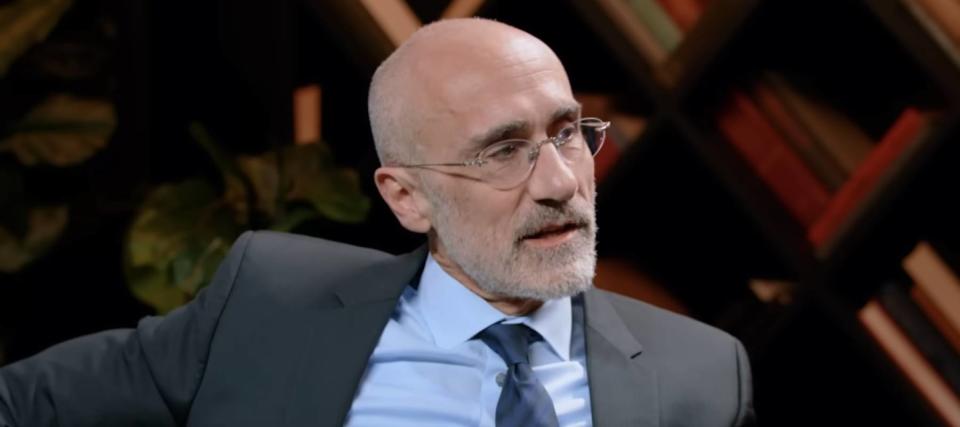This Harvard professor argues of the 5 things you can do with your money, only 4 will bring you happiness

While you can’t “buy” happiness, there are four things you can do with your money that will bring you happiness, according to Arthur Brooks, a professor who teaches the science of happiness at Harvard Business School.
And there’s one that won’t.
Don't miss
Commercial real estate has beaten the stock market for 25 years — but only the super rich could buy in. Here's how even ordinary investors can become the landlord of Walmart, Whole Foods or Kroger
Cost-of-living in America is still out of control — use these 3 'real assets' to protect your wealth today, no matter what the US Fed does or says
These 5 magic money moves will boost you up America's net worth ladder in 2024 — and you can complete each step within minutes. Here's how
“You can buy stuff, you can buy experiences, you can buy time, you can give it away or you can save it,” Brooks tells George Kamel — a personal finance personality and co-host of The Ramsey Show — on a recent podcast episode.
“Four of them will bring you happiness and one won’t,” says Brooks. “Your brain is telling you to do the one thing that won’t bring happiness, which is to go buy stuff.”
That’s because, he says, humans are hardwired to “rise in the hierarchy.” We do that by signaling our success and status to others, such as displaying our wealth — that we have more “stuff” than we need to survive — which, in turn, is attractive to potential mates.
Most people aren’t aware of this Stone Age impulse. They think if they buy a fancier car, they’re going to be happier, but they’re not, says Brooks. So then they think they need an even fancier car. Once you understand this impulse, “you’re going to notice it and you have a fighting chance of changing your behavior.”
How money can actually bring you happiness
While buying stuff can’t buy happiness, Brooks points to four other ways that money can bring more happiness into our lives.
Buying experiences: If you’re going to spend money on an experience, do it with someone you truly love, “because then you’ll remember it forever,” says Brooks. We tend to think of “stuff” as permanent, while experiences are evanescent, but he says it’s actually the opposite: “You’ll forget the stuff and you won’t forget the experiences.”
Buying time: If you don’t like cleaning your house, hire someone to do it and “buy” back your time. But, as Brooks points out, don’t fritter away your time scrolling social media. Spend it doing something meaningful to you, such as “going for a walk in the country, spending time with the person that you love.”
Giving it away: While it sounds counter-intuitive, giving money away to a cause you care about will bring you joy — and, potentially, more money. Brooks’ research — going back 25 years — shows that the more you give to charity, the richer you get. Why? It comes back to psychology: “People who solve problems and give their money away are people who feel more effective and they earn more money,” he says.
Saving it: “Every dollar you save will buy happiness for you,” says Brooks. That’s because we’re hardwired to evolve. “Human beings don’t get that much satisfaction from arriving at a goal but making progress toward a goal,” says Brooks. “The dopamine pathways give you an anticipation of reward and that anticipation is really the sweetness of life.”
Read more: Car insurance rates have spiked in the US to a stunning $2,150/year — but you can be smarter than that. Here's how you can save yourself as much as $820 annually in minutes (it's 100% free)
“Debt is a form of happiness death”
While buying “stuff” won’t buy you happiness, the worst thing you can do is buy stuff when you don’t have the money for it, says Brooks. And borrowing money to pay for “stuff” is likely to make you more unhappy.
“Student debt lowers life satisfaction. Car debt tanks life satisfaction. Credit card debt is catastrophic for life satisfaction,” says Brooks. “Research shows that mortgage debt is the only kind of debt that doesn’t lower happiness” — unless it’s too big and you’re worrying about it all the time.
But even if you’re in debt, you’re not relegated to a life of unhappiness. After all, knocking down debt will give you the same dopamine hit as saving your money (and progressing toward a goal). That’s why the snowball method could be an effective debt-reducing tool — from a psychological perspective.
As you pay off a smaller debt, you feel the satisfaction (and dopamine hit) of making progress toward a larger goal (paying off your larger debt). “When you’re making progress on one part of your life, you start making progress on all parts of your life,” says Brooks.
So the secret to happiness might actually be pretty simple: Pay back your debts and live within your means.
What to read next
Car insurance premiums in America are through the roof — and only getting worse. But 5 minutes could have you paying as little as $29/month
Jeff Bezos and Oprah Winfrey invest in this asset to keep their wealth safe — you may want to do the same in 2024
Stop crushing your retirement dreams with wealth-killing costs and headaches — here are 10 'must-haves' when choosing a trading platform (and 1 option that has them all)
This article provides information only and should not be construed as advice. It is provided without warranty of any kind.